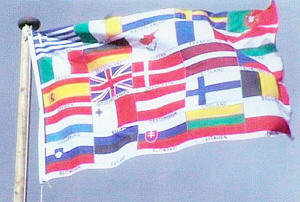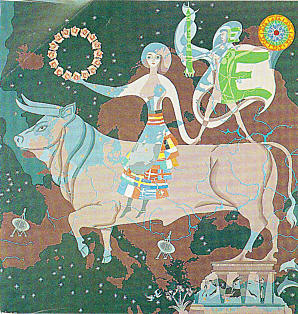Europe is the immediate home of many ethnic groups which share a common culture but different languages. To understand the present relation between the different European countries, it is necessary and unavoidable to take a view on the history which still exerts an influence on every star on the European flag and serves as a base for the strong reunion of people. Asking the question about the sources of such a stable political, economical and cultural being, is important - especially for us youngsters growing up in this great community. The main elements for our Christian and European Occident had already been set in the ancient world by the Greeks, Etruscans and Romans.
The name "Europe" derives from Greek mythology. When Zeus, the greatest god of the Greek religion fell in love with an Asian princess, whose name was "Europa", he decided to transform into a beautiful white bull hoping that she felt an immediate attraction to him. And he was such successful with his plan that the young princess was burning to ride on him. As soon as she got on his back, he started to run along the present-known European borders until he brought her to the isle of Crete.
The idea of the European Democracy is also attributable to ancient Greece, whose philosophers have influenced with their ideas not only the past, but also the present mindset, especially the "Ius Iures". But it was Charles the Great, who put his vision of the Christian Occident as a political union to practice. Political, social and cultural manufacture for example as well as the administration and the leadership of the church became harder and appeared in a similar way. That is why Charlemagne is known as the founder of a political and cultural Europe in the real sense. Above all the Christendom in Europe served as Supreme Court of appeal against the expansion of the barbarian Ottoman tribes. It also safeguarded the solidarity of the European Nations and served as a basis for law elaborated by the leader of the Christendom (Pope).
This knowledge is important to understand the culture, mentality and customs of Europe today. The fraternization of our continent can be seen particularly in the economy after the Second World War. Through the well-ordered contracts, productions developed which served not only for the own nation, but also for whole Europe as they were spacious and subject to expansion. By this, they represented their origin on the one hand, and helped the economy on the other hand. The result of what had been done in the past is that a great number of men from different nations works and lives in one country today.
The relation between the people also gets strongly influenced by the growing of Europe into one. Searching for a better life including a chance to work, led many people to the decision, especially after the Second World War, to emigrate to countries where they had a perspective for a safe and needed work - for example to Germany.
Because of a kind of " European open door" a formation of a multicultural society is inevitable, which is developing and growing up to a mixture of interests. Therefore there are more and more to mixed marriages for example married couples from different nations. Almost sixty years ago things like this were rather rare because men with different roots associated with their own compatriots to maintain their style of life and mentality. Children from this kind of marriages grew up with a bi- or even trilingual knowledge which gives them the opportunity to notify in whole Europe.
If this kind of lingual social changing gets established, it will be a great advantage relating to the fact that hearing exotic words will be part of everyday life and the discrimination against foreigners will become less because men would not only identify themselves as Italian, French or German but as Europeans which also would strengthen the solidarity among themselves.
Social themes like this escort us through our live here in the heart of Europe in the great country and new home Germany.
We see ourselves as a great example of the new way of life including adaptation and above all integration. We in particular come from immigration families and from mixed marriages. So we are exactly that what the inhabitants call "The new fellow citizens". Although we still accentuate our national roots because we feel privileged not to forget where we come from, we see ourselves as new generation of the European youth, especially because we feel like it.
In our circle of acquaintances there are many of those who immigrated with their whole family and claim Germany to their "Father" of the European family, even if their "real" fatherland is mostly Italy, Russia or Turkey. The cheap air fares to their home country which do mostly not cost more than a taxi charge tear the financial barriers down.
As soon as the first steps as a European immigrant are made there are almost no obstacles for creating a new basis. Because of the European connection it feels more like a move for working reasons than an escape. Nevertheless it is extremely hard for refugees to get through because they fear for their existence and they do not only strive for a work. That is the main reason why these men have such an ambition to integrate and make a career for themselves. More often exactly these people are managing to clear the hurdle of society and become more and more a part of it.
Students save their permanent residence while they study and open the door for a better future in the new country. But taking hurdles like this is very difficult and from there a grouping of youngsters with the same destiny is unavoidable. But very often this grouping causes exactly the opposite of what the youngsters have hoped for because soon the courage and will of getting adapted disappears. This hopelessness turns mostly into aggression and sadness which completes the vicious circle. It is understandable that for example the "Deutsch-Russen", Germans who stayed in Russia after the Second World War and came back to their roots with their family in hope of starting a better life, refuse to choose this hard and stony way.
Because of the flood of the mixtures the claiming to a fully nutritious member of society has raised up and especially the older inhabitants close their "Door" in fear of the new following citizens. That is why it still comes to an inner-city Ghetto forming in spite of the European philosophy and the border dilapidation. Especially for young people it is more dangerous to get out of their group than to search for alternatives.
We are able to claim that we know both sides of the life of an immigrant. Particularly one of us started a completely new life here in Germany and managed not to drift up in crime or in other stupidities, only because of his privileged family. That is the only way not to deviate from the right way, namely to work towards a safe and acknowledged life.
But also the interest of young people in the youth of different countries has risen up. Young people want to learn new languages on a voluntary way, by attending a language school and showing interest and openness towards other cultures.
Also the Medias are strongly influenced by the immigrants who brought for example new music styles into the new home. Nobody gets surprised hearing an Italian singing on a German radio show or on television where the charts are dominated by foreign groups. Even dancing to an Afro- German singing national love songs becomes not only normal but also a part of the community.
Food culture has become multicultural as well. Not rarely do you hear that somebody had croissants for breakfast, pizza fur lunch combined with a cold German beer and a meal at a Spanish nightlife fiesta in the evening.
That is the way we are - The new generation of Europeans with all its good and bad qualities and both sides of the medallion which serves as a guarantor for our strong and beautiful union.
Karen Shaverdov and Daniel Vedder



